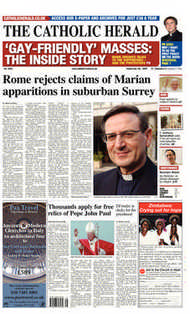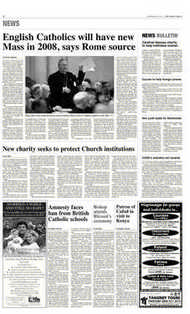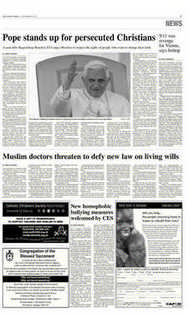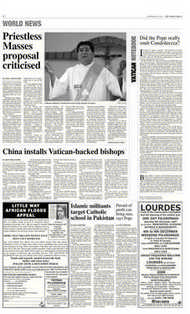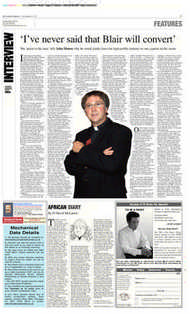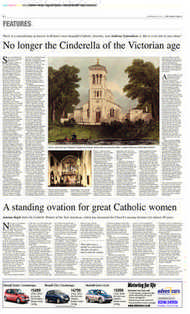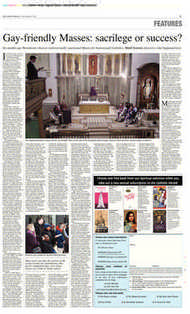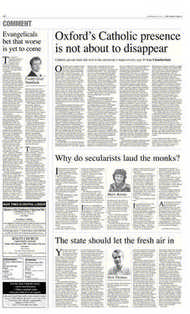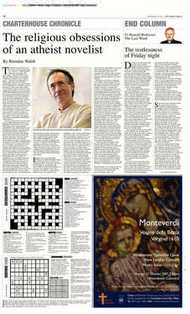Page 16, 28th September 2007
Page 16
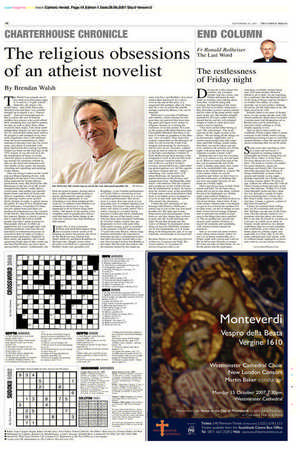
Report an error
Noticed an error on this page?If you've noticed an error in this article please click here to report it.
Tags
Share
Related articles
Catholic Colleges Toast World Cup Heroes
Rugby, Catholicism And The Conversion Of England
Avoiding All Things Foreign
/ A Told That The Most Dangerous Of Sports Is
Crusader For God And Country
,christianity In Touch On And Off The Field
The religious obsessions of an atheist novelist
By Brendan Walsh
The World Cup reminds me of just what an awful game rugby is. I went to a “rugby school”. Absurdly, the priests who taught there – men from Mayo and Wexford who had been very sensibly brought up to regard it as a “foreign game” – had convinced themselves that to attract the sort of English middle-class parents who could afford their whopping fees you had to guarantee that, as well as daily Mass, there would be daily rugby. Like most small independent schools we sent out cheerful, fit, well-drilled teams each week to be gouged at and stamped on by enormous lugubrious boys with sideburns from the local comprehensive. After training or playing every day for seven years, just about, I remember with deep satisfaction the evening I joyfully binned my boots on the final day of the 1972 season. It was the end of it all, the humiliation of being invisible when the player in possession is looking around for someone credible to pass to, the awkward intimacies and sour smells of the scrum, the fatuous whistling and signalling and pointing of the referee.
They are trying to dress up the world cup as a Major Sporting Event, with highlights on the telly every evening being analysed by former players sprawled on sofas. But having the odd Dutchman in the last 16 of the world championship doesn’t make darts a world game, and neither can operatic theme music and shots of Asian and African supporters with face paint in the opening credits cover up how thinly interest in rugby is spread across the globe. It’s big in New Zealand and with Afrikaners. A handful of Lisbon lawyers appear keen and there are pockets of enthusiasm in a few corners of the Pacific. But even the Welsh have lost interest. Rugby is clearly a game that is specially devised to enable people who aren’t good at games to beat people who are. It offers an opportunity for overweight men with drinking problems who lack the eye and hand co-ordination necessary to succeed at darts to make a living as professional sportsmen. England, to their credit, are hopeless, but a more surprising bright spot of this world cup has been that Ireland, too, have been spectacularly useless. Traditionally, the Irish are good at games, boxing above their weight and regularly putting in plucky performances against larger and wealthier opponents. It was refreshing to see them outplayed last week by 15 students from Moldova or Armenia or wherever it was who happened to be in France tiling bathrooms. The march of any nation is not complete until its people have discovered that there are better things to do with one’s leisure time than hoofing a ball around.
Iexpect this is just a tiresome Fulham and north Kensington thing but everyone I know seems to be banging on about Atonement, the novel by Ian McEwan now filmed with James McEvoy and Kiera Knightley in the lead roles. People swoon unreservedly over McEvoy’s portrayal of Robbie Turner and squabble over Knightley: is her wooden performance as Cecilia Tallis a convincing evocation of smothered emotion or is it just a wooden performance? But Atonement is a story that nags away at you long after you’ve stopped arguing over the acting. You know what the story is about, but what’s it really about? On a sultry evening in a country house luscious Cecilia and clever, handsome Robbie, the son of the family cook who has been seen through Cambridge by Cecilia’s father, realise they are desperately in love with each other. That same evening, a girl is assaulted in the grounds. Cecilia’s precocious 13-year-old sister Briony, whose imagination outstretches her experience, misreads the day’s complicated events and half-convinces herself and everyone else (except Cecilia) that Robbie is the rapist. By the time she realises the devastation caused by her made-up story, Cecilia’s and Robbie’s lives have almost been destroyed. In a clever twist at the end of the story, it is suggested that perhaps, after all, there may be a way in which the terrible damage caused by Briony’s lie can be repaired.
McEwan is a novelist of deftness and subtlety, whose distaste for religion does not prevent him from turning again and again in his stories to religious themes, as if testing the resilience of secular pieties. It is part of the gospel of Richard Dawkins and Christopher Hitchens that there is no lack of wonder or grandeur in the atheists’ view of reality. They insist that without superstition or the delusions of faith we can invest the world with purpose and meaning. In Atonement and his next novel, Saturday, without giving an inch to what he would regard as the false consolations of belief in God, McEwan has been putting in the imaginative work to test out this assertion. (I haven’t read his latest, On Chesil Beach, yet but I’m told it revolves around McEwan’s other abiding preoccupation, sex. All this agonising about religion and sex – there’s something very sweet and C of E about McEwan.) In Saturday he applies pressure to the decency and compassion of an ‘irredeemable materialist’ who believes that the richness and complexity of the world will one day be explained by science. In Atonement he worries away at the possibility of forgiveness and reconciliation when there is no higher power to appeal to, or to be at one with, than the author who creates the characters.
Unlike the glib certainties of the Grumpy Old Atheists, McEwan’s stories tug at you in the way that good parables do. Do right and wrong, forgiveness and reconciliation, come from us, are they things that we have to pour into the world and keep stirring? Or are they knitted into the weave of things? Is atonement something we have to effortfully summon out of our imagination, or is it something to be hungered for, and, if we are fortunate, occasionally to be received?
Brendan Walsh is the editorial director of Darton, Longman and Todd. His e-mail address is brendanw@ darton-longman-todd.co.uk
blog comments powered by Disqus


